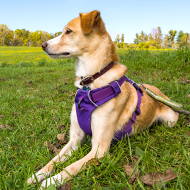Study seeks dog owners for harness design research

"This is really important in helping owners to make informed decisions about harnesses that are most suitable for their dog" - Dr Anne Carter.
Researchers from Harper Adams University and Nottingham Trent University are working on a project to understand how harness designs affect dog movement and are seeking help from dog owners worldwide to gain information.
Dr Jacqueline Boyd, senior lecturer in Animal Science at Nottingham Trent University, who is working on the project, commented on its purpose: “Harnesses are an increasingly popular way to keep our four-legged friends safe and under control.
“This project will help us to understand whether there are any implications of different harness designs on canine biomechanics in some of the most popular breeds in the UK.”
For the first stage of the work, the research team are asking dog owners to complete a short survey, with questions concerning what kind of activities owners do with their dogs, and what type of equipment they use for walking their dogs.
Any dog owner over the age of 18 years old, regardless of location, can participate in this stage of the study.
Dr Ellen Williams, lecturer in Animal Behaviour and Welfare at Harper Adams, said: “This is a really exciting opportunity to understand customer buying preferences and how they are shaped by market knowledge. Anyone who owns a dog is warmly invited to take part.”
For the second part of the study, dogs will be sought to examine how different walking harnesses affect movement, and will be walked over a pressure sensing mat in three different harness designs.
The team is seeking owners of pure-bred Labrador retrievers, Staffordshire bull terriers, French bulldogs and cocker spaniels between the ages of two and eight to participate, and the data collection will take place on one day between May and July.
Any owners who wish to participate can complete this registration form, and must be able to attend sessions at Harper Adams University, Nottingham Trent University or Canactive in Tewkesbury.
Explaining the importance of the project, Dr Anne Carter said: “This is really important in helping owners to make informed decisions about harnesses that are most suitable for their dog, and will help ensure canine welfare is not compromised by harness design.”
For further information about the harness design trial or the study, contact Dr Williams on ewilliams@harper.adams.ac.uk



 The latest
The latest